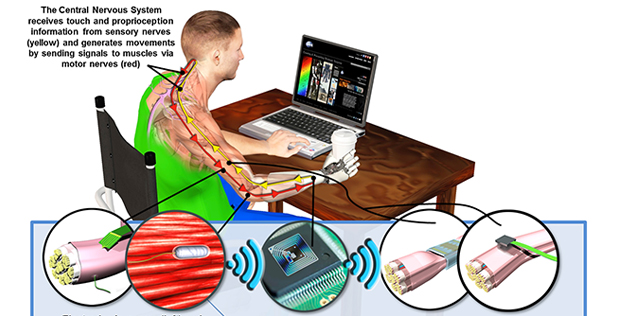Implantable prosthetic interface could deliver sense of touch
An electronics breakthrough made by specialists at Belgian research group Imec has enabled the development of a prototype implantable chip that could enable future prosthetic devices to convey a sense of touch.


The chip has been developed through haptics research funded by DARPA in the US
Developed in collaboration with researchers at the University of Florida as part of the IMPRESS (Implantable Multimodal Peripheral Recording and Stimulation System) project funded by the DARPA’s HAPTIX program, the technology could ultimately help provide patients with sensory information by delivering precise electrical patterns to the wearer’s peripheral nerves.
Current prosthetic arm technologies work by reading signals from the wearer’s muscles or peripheral nerves to control electromotors in the prosthesis. However, these devices still don’t allow fine motor control or give patients a feeling of touch.
Commenting on the new chip Prof Rizwan Bashirullah, director of the University of Florida’s IMPRESS program said: “This effort aims to create new peripheral nerve interfaces with greater channel count, electrode density, and information stability, enabled largely by Imec’s technological innovation.”
Register now to continue reading
Thanks for visiting The Engineer. You’ve now reached your monthly limit of news stories. Register for free to unlock unlimited access to all of our news coverage, as well as premium content including opinion, in-depth features and special reports.
Benefits of registering
-
In-depth insights and coverage of key emerging trends
-
Unrestricted access to special reports throughout the year
-
Daily technology news delivered straight to your inbox







Water Sector Talent Exodus Could Cripple The Sector
Well let´s do a little experiment. My last (10.4.25) half-yearly water/waste water bill from Severn Trent was £98.29. How much does not-for-profit Dŵr...